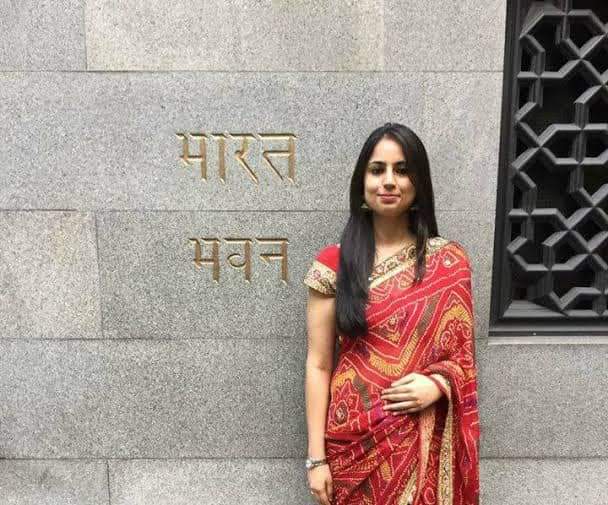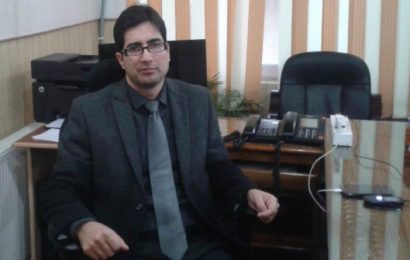The Key virtue is ’empathy’: Shireen Moti
Shireen Moti is an legal academic and personality of par excellence. She recently bagged prestigious Women of future : 50 Rising Stars in ESG award .
In an exclusive interview with the News Kashmir she talks to Farzana Mumtaz and Rameez Makhdoomi.
1. You have bagged prestigious Women of the Future: 50 Rising Stars in ESG award . How do you feel ?
The Women of the Future:50 Rising Stars celebrates the talented female trailblazers and role models aged 35 and under from around the world who are at the forefront of ESG. I believe that law is an instrument of social change. Lawyers are social engineers and have the ability to contribute towards the betterment of society. It feels wonderful to have been bestowed with this international recognition for my work on increasing access to justice through legal aid for rural communities in Haryana and Jammu & Kashmir.
2. A bit about your early days of life ?
My family hails from Rajbagh, Srinagar. I am the granddaughter of Shri Omkar Nath Moti and daughter of Shri Anil Moti, who resided in ‘Motivilla’ Rajbagh. Unfortunately, during the 1990s we were forced to leave Kashmir due to terrorism in the State. We lost everything from home, father business, family lives during this genocide. My family survived this holocaust but trauma of exodus, leaving our home in Kashmir is still there. From 30 years, I have seen my grandparent and parent reliving the pain of exodus and wanted to go back their home in Kashmir but could not go in fear of losing their lives.
I was taunted and bullied by my seniors, classmates, colleagues in school , college, jobs as “Bhagore Kashmiri pandits” (…English meaning ) and I always faced this question “why you left Kashmir” and “You Kashmiri Pandits did not have courage to fight” and faced so many nonsense and abusive messages during my childhood till now. The irony is that in our country we “Kashmir pandit” became migrants and to be very truthful exodus was not limited to 1990s but every Kashmiri pandit family faces the pain of exodus every day in their life.
Even I faced humiliation, abused, taunts, bullied from society, I believe in the Gandhiji ideology of non-violence and a proud “Kashmiri”, and no one can snatch this identity from me. I am still hopeful that one day our Kashmir will be same paradise as I have heard from my grandparents and parent and everyone including all community will live together singing the songs of sharda…….
3. How was academic life like ?
The fact that I chose legal academia over the other opportunities that I had in the corporate world, is because of my passion for education. As an undergraduate student at Jindal Global Law School, O.P. Jindal Global University, our Founding Vice Chancellor, Professor C. Raj Kumar always encouraged his students to dream big and to follow their dreams. That lesson will stay with me throughout my life. As a postgraduate student at Queen Mary University of London, I got the opportunity to debate, discuss and deliberate upon global issues with my colleagues from diverse backgrounds. I underwent the
4. Your take on progress of feminist movements in India ?
There is a huge misconception when it comes to feminism in India. Feminism is nothing but the equality between men and women. I believe that women across the globe have benefitted from the contribution of the feminist movement coupled with technological revolution. There has been a change in the ‘role of women in society’ and one can see this in our own homes. Simply put, if we compare three generations of women in a family, we can see progress. Having said this, violence against women, such as domestic violence continues to be a global pandemic and such issues need to be deal with more stringently at the law and policy levels.
5. Are we as a country still lagging in legal education. Your take as expert?
Given the globalized nature of the legal profession, legal education has to cater to the changing needs of the profession. Law students have to be equipped to work across jurisdictions. The law school curriculum has to undergo changes to produce lawyers of the future. The regulatory bodies should take this up more seriously.
6. A brief description of your book A Guide to LLM admissions and scholarships abroad?
The Guide to LLM Admissions and Scholarships abroad discusses every component of the admissions and scholarships application process in a detailed manner and offers practical advice to prospective Master of Laws programme students for the preparation of excellent applications for admissions, which will help them stand-out amongst thousands of other qualified applicants. It includes chapters on law school rankings, statement of purpose, curriculum vitae, letters of recommendation, law school admission council services, fundamental information of twenty selected laws schools in the United States of America, key information of ten selected law schools in the United Kingdom, external scholarships or fellowships, scholarship essays, research papers and English language test examinations.
7. Your future goals ?
As a legal academic, I would like to contribute to scholarship in the area of Constitutional Law and Theory, transnantional feminism, clinical legal education, legal education, and violence against women. I would like to continue working in the area of human rights, with a focus on access to justice and legal aid and develop more collaborations with NGOs and civil society organizations towards achieving the goal of ‘access to justice for all in India’.
8. Who inspires you most ?
My father, Mr. Anil Moti, is my inspiration in life. I would like to emulate his qualities of resilience, strength of character, hard work, and zeal for life.
9. What us your message to humanity at large ?
Most wars can be avoided by dialogue and discussion. The key virtue is ‘empathy’. We need to be more empathetic towards each other and the circumstances that we are facing.




